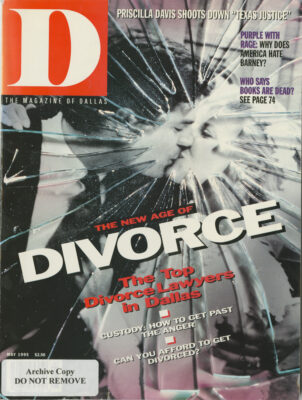THINGS JUST AREN’T AS MUCH FUN FOR DIVORCE lawyers these days. Time was when these guys- and they were mostly guys-simply loaded up on testosterone, maybe a couple of noontime Scotch and waters or a few dirty details on the opposition, and blew into court turning people’s lives upside down, churning discontent along with outrageous fees.
Those were the good ol’ days for local divorce hawks tike Bill Koons, Ken Fuller, joe Geary, and Don Smith. Working through committees of the state Supreme Court, the Texas Legislature, and the Family Law Council of the State Bar, these legal pioneers helped to formulate the laws under which divorces are granted and used the rules to suit themselves.
But something happened over the past 10 years to change all that. Mediation and joint custody have made accommodation between warring spouses easier and courtroom histrionics increasingly irrelevant. The rules of evidence demand a greater precision, so that, for instance, if an attorney fails to object to the surrender of all financial records in a marriage, his client may be ordered to rummage through drawers and under car seats for cleaning bills and tollway receipts.
And all the while, younger attorneys were coming into practice-many of them women-ready to flourish in this new environment. Most of these new attorneys don’t even identify themselves as “divorce” lawyers; they are family law specialists whose job is to dissolve families as painlessly as possible, not storm the Bastille.
The new-breed family law specialist is equal parts accountant, educator, and psychological counselor, speaking in the measured tones of a network news anchor.
The last time D Magazine selected Dallas’ best family lawyers was in December of 1988. This time, the process was more difficult because many of the divorce law veterans either have retired or reduced their caseloads dramatically. So, with the field wide open, we conducted a mail-in survey of more than 100 attorneys in family law and other specialties, family court judges and masters, forensic psychologists, and the leaders of child and family advocacy groups. We asked each respondent to name the top family lawyers in Dallas, along with the best or worst in a number of categories,
From this pool of experts we received more than 50 responses, and we scored them as follows: 1 point if an attorney voted for himself or herself; 2 points fat selection by a member of the same law firm; and 4 points for selection by others.
The accompanying story on Ike Vanden Eykel and Mike McCurley (page 69) profiles our top two vote-getters.
Here is a look at the next four:
In many ways, BRIAN WEBB IS THE HEIR APPARENT TO THE stem-winding divorce lawyers of old. Webb is a big, friendly teddy bear of a man, everyone’s favorite drinking buddy. He is the perfect affable complement to his more tenacious partner, Mike McCurley.
“I think my style is not to destroy relationships,” Webb says. “In that way, settlement is possible. Then if we have to go to court, the other side usually is caught off guard by my intensity.”
For years, Webb, 45, has toiled in the shadows of his better-known friends, McCurley and Vanden Eykel. But he has emerged at the top of his profession. If there is a rap on Webb, it is that he doesn’t work hard enough, that he still tries to get by on gut instinct.
It’s a charge he responds to with a shrug. “When you’re very accessible to a client, sometimes people wonder if you have enough to do,” he says. “1 merely think you should make yourself available to people who pay you very well.”
Over time, Webb has handled some high-profile divorce cases, including those of golfing great Lee Trevino and the wife of George Lott, the Tarrant County courthouse assassin. But the divorce that taught him the most, he believes, was his own recent turn at the courthouse.
“It reminded me what drudgery a divorce can be and how time seems to stand still while you’re going through that,” he says. “It had to make me more sensitive to people going through it.”
Webh is well known and liked in the Dallas family courts-but he never considered handling the divorce himself
“I wouldn’t do a stupid thing like that, even if 1 had the time,” he says.
Apparently, there is more than one JOHN MCSHANE. To those who oppose him, McShane is overbearing, self-righteous, and much too confrontational-an attorney who will do anything to win for the sleaziest of people.
To those who are on his side, he is a passionate, spiritual risk-taker and a champion of the underdog.
Few attorneys inspire more conflicting opinions than McShane, a 51 -year-old recovering alcoholic who has been married to the same woman for 30 years and has two grown children.
“Because of my personal experience, I have carved out a unique sub-specialty,” he says, “providing legal services to victims of substance abuse, domestic violence, depression, and any number of mental-emotional problems.”
Because McShane and his partners, Larry Hance and Edwin Davis, believe family disputes overlap with other legal fields, both McShane and Davis specialize in another area of the law as well as in divorce.
McShane, who is board-certified in family and criminal law, sees his job as that of counselor and problem-solver to people who may have multiple legal troubles due to their personal difficulties. If he is pushy, he says, it’s because many of his clients start with so many self-inflicted handicaps.
“For example, I’ve had physicians with an alcohol or drug problem who’ve gotten in trouble with the Stare Board of Medical Examiners,” McShane says. “The problem comes out as a dysfunction in the marriage, and so they get divorced. And since they’ve been prescribing drugs for themselves, they’re fighting criminal charges.”
McShane often requires such potential clients to seek treatment for their problems, then look at the possibility of reconciling with a spouse before he agrees to be their lawyer. This earns him the charge that he is “playing God” with their lives. But to people who are fighting such problems, McShane’s actions look like the best possible form of tough love.
That’s the way it looked to one alcoholic young mother, She was being divorced by her husband, who threatened to take away her two children, and she saw McShane as her last hope.
“Boy, was I a mess,” she says. “John made me get treatment, and we went to really extraordinary lengths to prove to the court that I was staying sober.”
Her husband tried to have her parental rights terminated in a messy divorce that lasted two and a half years.
“But 1 have joint custody now, and I’m still sober,” she says. “I don’t know what other people say about John, but he did more for me than you can expect an attorney to do. He saved my life.”
MIKE GEARY LEARNED LAWYERING UNDER THE GUIDANCE OF HIS father, Joe Geary, a master courtroom strategist and former Dallas City Council member.
Growing up around Dallas legal and political figures, the 40-year-old Mike Geary learned the value of hard work, attention to detail and the ability to organize facts.
What he didn’t seem to learn is the art of converting courtroom finesse into high-profile status, an ability that made his father a larger-than-life character.
But seeking the limelight just isn’t Mike Geary’s style. While Joe is flamboyant, Mike is methodical. While Joe could kill with a look, Mike is a hit man only when armed with indisputable -facts. While Joe is one of the last great legal generalists, Mike is a specialist in property valuation and the arcane process of tracing money to its source.
Stories about Joe Geary’s courtroom exploits abound. You could sooner drag a coach and four horsemen out of Mike’s mouth as wrest from him the intimate details of a case.
He rarely handles child custody matters, which he says depend more on emotion and subjectivity, with few hard tacts. What Mike Geary enjoys is digging through piles of business data to extract just the nugget that makes his point, protecting his client’s assets from what he considers pillaging by the opposition.
A perfect example of Geary’s workmanlike approach to his craft is the panel discussion he led at a recent family law seminar. Its title: “Securing Equalization Payments with Closely Held Securities.” Sounds boring-but his opponents know better than to fall asleep.
Nothing bothers TOM GORANSON as much as people who don’t play by the rules. Reason, fairness, common sense-for Goranson, these are the attributes that lead to an effective settlement of legal claims.
“When a case goes to court, that usually means someone is wrong,” he says. “Or cheating.”
This was the case in a recent divorce that Goranson handled on appeal. Goranson’s client presented serious allegations of marital misconduct against his wife. What bothered Goranson were suspicions that the wife and her boyfriend were hiding assets.
So Goranson and his team traced the money, proved the case, and walked away with more than 90 percent of the marital estate for his client.
“We slam dunked them because they got greedy,” he says. In most cases, he would prefer to sic down with another attorney, or the two attorneys with a mediator, and reason together.
Goranson’s conservative approach may come from the 16 years he spent as the in-house family law expert at mega-firm Akin, Gump, Strauss, Hauer and Feld before establishing his own family law boutique in 1987.
Of all the family lawyers responding to our survey, Tom Goranson was the only one who didn’t vote for himself. Call it modesty. He learned long ago that 95 percent of all cases are determined on the facts, while 4 percent are lost because of the actions of one lawyer or the other. In only 1 percent of the cases, he says, does the lawyer actually get up in court and win for the client.
“It costs money to argue,” says Goranson, a 49-year-old divorced father of two grown sons. He sees a future where more family law decisions are administrative, being determined according to set rules and guidelines.
Goranson’s career proves that these days, selecting a hot-shot courtroom gladiator may not be as important as it was in those thrilling but expensive days of yesteryear.
(Mostly) Honorable Mentions
THE MOST COMMON COMPLAINT ABOUT our selection process? Some resppndents feared there were more good family lawyers than we could mention in the story.
The following well-regarded attorneys either have been in practice for less time, specialize in one area, or just don’t have as wide a reputation as those listed above. But as one of the top six said about Mary McKnight, “On any given day, she can kick anybody’s ass in court, and does.”
Also included in this group are Kevin Fuller, Katherine Kinser, Paula Larsen, Tom Raggio and Susan Vrana.
Want a Confident Attorney?
On his survey, Jay Fichtner named himself as the best lawyer and as No.1 in all the other positive categories. No other attorneys were listed.
Need a Junkyard Dog?
The attorney listed by many as “most likely to leave all sides bloodied” and “most difficult” was Chris Weil.
Want to Settle it Amicably? Much decision-making has moved from the courthouse to the office of R.B. Pool. His office bas taken on a quasi-judicial standing, since most settlements reached there ,and agreed Co by both parties are rubber-stamped by the judge in the case.
Want to Take the High Road? Paula Larsen, a family court judge until she was defeated in the last election, was cited often as “most ethical.”
Get our weekly recap
Brings new meaning to the phrase Sunday Funday. No spam, ever.
Related Articles

Media
Will Evans Is Now Legit
The founder of Deep Vellum gets his flowers in the New York Times. But can I quibble?
By Tim Rogers

Restaurant Reviews
You Need to Try the Sunday Brunch at Petra and the Beast
Expect savory buns, super-tender fried chicken, slabs of smoked pork, and light cocktails at the acclaimed restaurant’s new Sunday brunch service.

Arts & Entertainment
DIFF Preview: How the Death of Its Subject Caused a Dallas Documentary to Shift Gears
Michael Rowley’s Racing Mister Fahrenheit, about the late Dallas businessman Bobby Haas, will premiere during the eight-day Dallas International Film Festival.
By Todd Jorgenson


